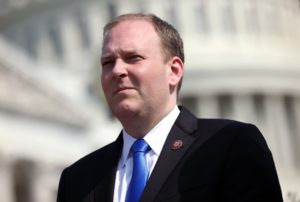
Donald Trump (Photo by Michael B. Thomas/Getty Images)
Less than one week after the Supreme Court overturned Roe v. Wade, voters across seven states will be casting ballots in primary races that will ultimately determine the shape of Congress in 2023. For Democrat candidates, the hope is that potential supporters will consider the SCOTUS ruling a step too far. For GOP contenders, with an influx of more than one million party allegiance switches in their favor this last year, the question again comes down to how much influence former President Donald Trump still retains. And, of course, whether the reversal of Roe will eat away at that electoral gift.
A Small Bite of the Big Apple
New York’s gubernatorial primaries are hot news all over the country. This year sees Governor Kathy Hochul attempting to defend the position handed to her with former Governor Andrew Cuomo’s undignified exit. Notwithstanding her six years served as lieutenant governor, Hochul struggled almost immediately after assuming her place in the governor’s mansion, from losing her hand-picked number two after a federal corruption probe arrest to rising crime numbers and violence on the streets. Her recent favorability has slumped precipitously to just above 20 points, and she is being hit from both sides by her Democrat challengers, Jumaane Williams and US Rep. Tom Suozzi of Long Island.

Lee Zeldin (Photo by Kevin Dietsch/Getty Images)
Williams is an ultra-progressive who accuses the governor of either being “consistently shamefully out of the loop, or shamefully enabling through her inaction.” Suozzi, on the other hand, says that Hochul is far too soft on crime. However, despite all this, the governor is predicted to win the primary by a wide margin.
For the GOP, a crowded field includes Rep. Lee Zeldin, Andrew Giuliani, Rob Astorino, and businessman Harry Wilson. Polling gives Zeldin a roughly two-point lead over second-place Giuliani, but the contest is very much wide open. Although former Vice President Mike Pence has endorsed the frontrunner, Trump himself has stayed out of the competition. Giuliani is likely hoping his father’s connection to fighting crime as “America’s Mayor” will be enough to clinch the win.
Due to lawsuits over redistricting which saw the proposed maps thrown out, the US House and Senate primaries for New York will not take place until August.
All the Noise in Illinois
The 15th district GOP primary in Illinois sees two incumbents going head to head due to newly drawn boundaries. Trump-backed Rep. Mary Miller faces Rep. Rodney Davis in a contest that will, without doubt, be used as a yardstick to measure the 45th president’s enduring sway. Davis supported the creation of the January 6 congressional inquiry, whereas Miller – although lagging behind in fundraising – has the support of both the former president and Rep. Marjorie Taylor Greene (R-GA). Whoever wins this primary is projected to also take the seat in the midterms.

Donald Trump (Photo by Michael B. Thomas/Getty Images)
As well as backing Miller in Illinois, Trump has also made a high-profile endorsement in the Republican gubernatorial primary. The six-person battle to become the GOP candidate for governor is underway. The former president is backing conservative farmer Darren Bailey for the role, who is so far outpolling his nearest rival, Richard Irvin – mayor of Aurora. Irvin has the money behind him and is considered by Democrats as more of a challenge to incumbent Governor J.B. Pritzker. This race, in particular, will be of interest to those who feel Republicans are ready to move on from Trump.
A Colorado Spring?
Incumbent Democratic Sen. Michael Bennet is considered a vulnerable target this November. With a minus five-point approval rating, Bennet was formerly considered a rising star in the party and won a significant victory to gain his second term in 2016. However, with an unpopular president in office and a lack of local support, this seat could potentially be a GOP flip.
Hoping to face Bennet are GOP businessman Joe O’Dea and state Rep. Ron Hanks. While O’Dea has been a money-raising machine and is pro-choice, Hanks has struggled to pull in donations. However, a pro-Democrat SuperPAC, Democratic Colorado, has spent an estimated $3 million to support Hanks in the hopes that he would be an easier candidate to beat in November.
Rep. Lauren Boebert is also facing a primary challenge in Colorado from state Sen. Don Coram. Boebert is well-known for her fiery rhetoric and support of Donald Trump, a position that Coram hopes to leverage with the state’s independent voters who are eligible to vote in the primary.
Did Someone Say Special Election?
For the first time in 70 years, Nebraska will hold a special election to fill the seat vacated in March by long-time Representative Jeff Fortenberry, who will be sentenced today for charges related to campaign contributions. The GOP candidate, Mike Flood, will face Democrat state Senator Patty Pansing Brooks for the opportunity to serve until January 2023. The state has reliably returned three GOP US House representatives in all recent elections except for one close race in 2014 and will most likely go to Flood this time around.
South Carolina Runoff
 One final race of note is the Democrat runoff for the US Senate seat currently held by Republican Sen. Tim Scott. The two runoff opponents are state Rep. Krystle Matthews and author Catherine Bruce. In the June 14 primary, Bruce finished ahead of Matthews by less than 2,500 votes, with neither candidate gaining more than 35% of the ballots.
One final race of note is the Democrat runoff for the US Senate seat currently held by Republican Sen. Tim Scott. The two runoff opponents are state Rep. Krystle Matthews and author Catherine Bruce. In the June 14 primary, Bruce finished ahead of Matthews by less than 2,500 votes, with neither candidate gaining more than 35% of the ballots.
While much of the momentum is with Matthews, recent conversations recorded by Project Veritas exposed that she wanted to put “sleepers” into the GOP to “wreak havoc for real from the inside out.” Further, she said in a phone call to an acquaintance – currently in prison – that she would not be averse to receiving “duffle bags” of “dope money” under false names to help her campaign.
As this story has been widely ignored by the legacy media, it may not impact her runoff chances, but it could undoubtedly prove an issue if she faces Sen. Scott in November.
Enough to Tip the Balance?
America’s increasing displeasure with the Biden presidency does not automatically mean that voters are swaying back toward Donald Trump. And yet, the former president’s prescience in predicting what a Biden administration would imperil and oversee will certainly have a number of folks wondering if mean Twitter messages are better than no coherent message at all.
Remember to check out the web’s best conservative news aggregator
Whatfinger.com — the #1 Alternative to the Drudge


